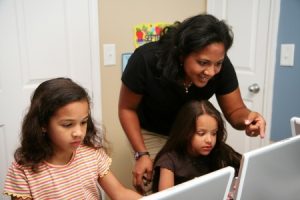 It’s easy to think of your home computer as a babysitter. It keeps your children occupied and close by, and depending on how they spend their time, it can actually be a valuable educational tool.
It’s easy to think of your home computer as a babysitter. It keeps your children occupied and close by, and depending on how they spend their time, it can actually be a valuable educational tool.
It is also a portal into the outside world, for better or worse. While it gives your child access to a vast amount of information, it can also give others access to the lives of children. Parents read about nightmare cases of missing children, coaxed out of their homes over the internet. But there are steps you can take to make sure this doesn’t happen.
While there are plenty of automated filters available that can help to keep your children out of danger on the internet, nothing can replace actual involvement in their internet life. You should make it habit to join them when they go online. It’s not that you need to be looking over their shoulder every second, but you should make them aware of the possibility at all times. It’s recommended to not tolerate secrecy, and it would be wise to make surfing the internet a family activity.
There are more specific steps you can take to make sure your children are safe. For one, make sure you know everything they sign up for, especially social media sites. Log on with them and take a close look at the settings. Eliminate the ability for others to find them through searches, and make their profiles invisible to strangers. Adjust privacy settings so that personal information is only shared with the friends of which you approve.
There is one adult, however, who should have access to everything your child posts online. That person is you. Real-world monitoring is important, but you can also keep an eye on your child by connecting to them in cyberspace. Make sure you follow them on every social media website and that they are sharing everything they post with you. Just try to avoid embarrassing them in front of their friends online—trust us, this will only make things worse.
Since there’s no foolproof way to guarantee online safety from afar, you should also have an ongoing conversation with your child about internet activity. Remind them that posting messages, pictures, and videos online has real consequences, and that there is certain information that should never be shared. After they’re on the computer, ask them what they’ve been up to, just as you would if they came home after hanging out with friends.
Even the best kids can get themselves into trouble online. Our children are growing up in an entirely different world, one that is understood in different ways by different generations. Like any other aspects of your child’s life, the most important thing is to stay involved.
